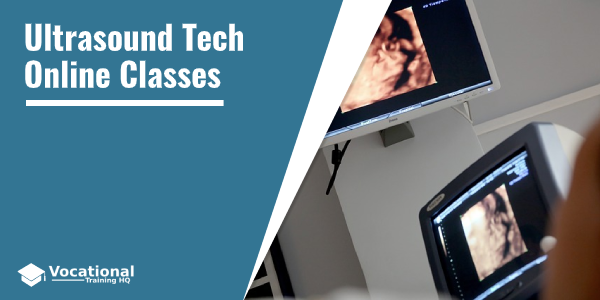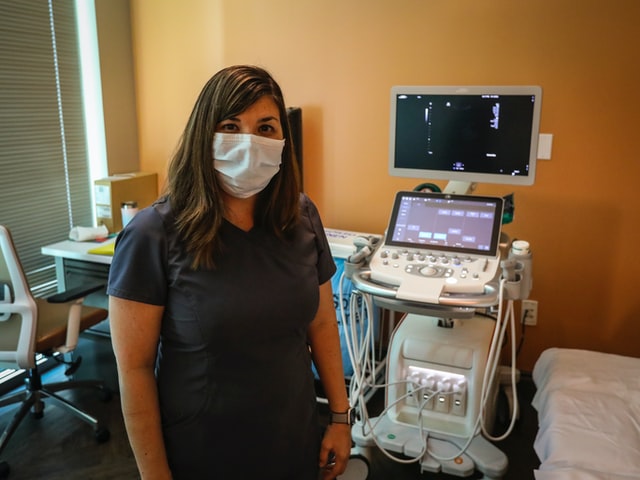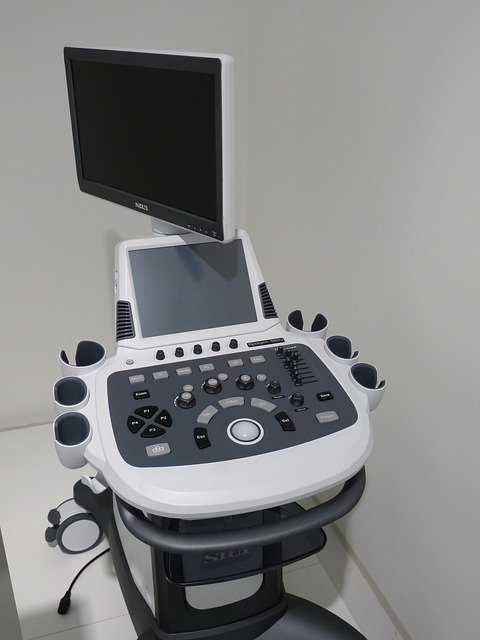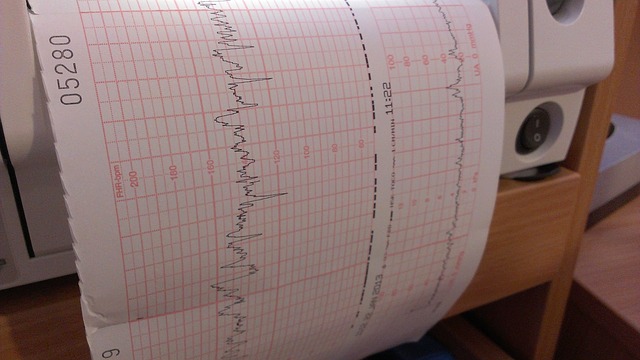Ultrasound technicians, also known as diagnostic medical sonographers, play an essential role in the medical field.
Responsible for assessing and identifying a patient’s medical condition, ultrasound techs use imaging equipment to emit high-frequency waves.
These waves perform tests or record images on various parts of the body, including the reproductive systems, abdomen, heart and blood vessels, and prostate.
By examining parts of the human body, these medical professionals detect vascular diseases, heart diseases, pregnancy, and more.
Like many other careers in the medical field, the ultrasound tech career is in high demand within the US.
If you have ever wanted to pursue a career in medicine without having to undergo the long, arduous journey to become a doctor, a career as an ultrasound technician might be the right for you.
And what is exciting is that you can study to become an ultrasound technician right in your own home, thanks to the wealth of online programs available.
Article Table of Contents
- 1 What Courses Are in an Online Ultrasound Tech Training Program?
- 2 Can You Earn an Ultrasound Tech Certification Completely Online?
- 3 How Long Does It Take to Earn an Ultrasound Tech Certification Online?
- 4 How Much Does an Online Ultrasound Tech Certification Cost?
- 5 Types of Ultrasound Tech Certifications
- 6 Best Online Colleges Offering Bachelor’s in Sonography Degrees for 2025
- 7 Online Colleges Offering Sonography Degrees – Ranking Details (Updated for 2025)
- 8 Online Sonography Degree Overview & Career Information
- 9 Online Bachelor’s Degrees in Sonography
- 10 The Importance of an Accreditated Online Sonography Degree
- 11 Careers in Sonography
- 12 Benefits of Online Ultrasound Tech Training Programs
- 13 Drawbacks of Online Ultrasound Tech Training Programs
- 14 Benefits and Drawbacks of Online Ultrasound Tech Training Programs – Summary Table
- 15 4 Self-Study Tips for Ultrasound Tech Online Students
- 16 Schools Offering Online Ultrasound Tech Training Programs
- 17 Summary
- 18 Frequently Asked Questions
What Courses Are in an Online Ultrasound Tech Training Program?
No two online programs are completely identical, although the courses are relatively similar.
If you are studying diagnostic medical sonography, you can expect to take some of the following courses:
- Human anatomy – In this course, you will learn the relationship between the functions and structures of the body’s many different systems. Besides exploring the functional anatomy of the human body, you will also study the respiratory, cardiovascular, nervous, musculoskeletal, and gastrointestinal systems. Lastly, you will gain an understanding of disease pathologies that influence body function.
- Ultrasound physics & instrumentation – Here, you will be introduced to the instrumentation and physical principles of diagnostic medical ultrasound. Topics in this course will include fundamental ultrasound physics, transducers, resolution, focusing methods, modes of display, Doppler ultrasound, image recording devices, image optimization, and biological effects, to name a few.
- Pathophysiology – You will be taught the mechanisms of pathogenesis at the cellular, molecular, organ, and system levels. You will discuss real-life cases that connect pathophysiological mechanisms with a wide array of symptoms. In addition, you will gain a wide knowledge of the pathology of organ systems, which include nervous, endocrine, cardiovascular, renal, and respiratory disorders. This highly interactive class will utilize learning activities to help you explore various aspects of general pathologies, such as tissue repair, immunologically mediated diseases, cellular responses to injury, and neoplasia.
- Sectional anatomy – This course will teach you the sectional anatomy of the entire human body. Sectional anatomy presents high-quality diagnostic images from both CT and MRI modalities along with line drawings. This is meant to show the plans of anatomy that are most typically imaged. One of the main objectives of this course is to improve the ability of imaging professionals, e.g., ultrasound techs, to consistently create the highest quality diagnostic images.
- Abdominal ultrasound – Designed for ultrasound techs and clinicians interested in abdominal ultrasound, this course improves your confidence and skills in performing the abdominal ultrasound procedure. It will go over the protocols involved with the procedure in areas such as the abdomen, liver, kidneys, gallbladder, pancreas, abdominal vessels, appendix, and thyroid.
- Essentials of sonography & ethics – You will get an overview of diagnostic medical sonography, as well as the sonographer’s role in delivering health care. Additionally, you will examine and discuss the principles, policies, and practices of health care professionals, and you will also become familiar with the sonographer’s healthcare responsibilities. One key topic in this course will be ergonomic principles of sonography and how they prevent or reduce work-related musculoskeletal disorders.
- Obstetrics & gynecology – This course will focus on women’s health issues, including contraception, pregnancy, and other reproduction-related issues. You will be introduced to topics like regimens and updates, as well as special considerations when working with patients. Finally, you will learn everything you need to know about minimally invasive gynecologic surgery, reproductive endocrinology and fertility, and urogynecology and gynecologic oncology.
Can You Earn an Ultrasound Tech Certification Completely Online?
Although there are several ultrasound tech certificate programs that offer online courses, students typically have to complete clinical requirements onsite at a hospital or medical clinic.
They may also need to fulfill simulation center and laboratory requirements on campus.
That is mostly due to the hands-on nature of the job.
Because ultrasound techs are required to operate equipment and treat patients in person, they need to gain practical hands-on experience in order to perform their job well.
Luckily, a great portion of your training can be conducted online, which can be extremely beneficial if you are a busy working professional.
It can also be very affordable for those who are on a budget.
How Long Does It Take to Earn an Ultrasound Tech Certification Online?
Most programs for ultrasound techs last between 18 and 30 months.
The duration of your program depends on a number of factors, including your educational background, the program you have chosen (e.g., online program vs. in-person program and certificate program vs. degree program), and your time commitment.
Associate’s degree programs, most of the time, are significantly shorter than bachelor’s degree programs.
If you are on a budget and have less time to spare for your studies, an associate’s degree program in sonography might be best for you.
However, if these are not important factors for you and if you want better opportunities for advancement, in the long run, you might want to pursue the bachelor’s degree program.
If you want to completely forgo the degree programs, you can opt for a certificate program, which costs less than the associate’s and bachelor’s programs and generally takes much less time to complete.
How Much Does an Online Ultrasound Tech Certification Cost?
While associate’s and bachelor’s degree programs can cost up to $40,000 and $90,000, respectively, certificate programs can cost up to $25,000.
If low cost is important to you and if you want a really high return on investment, you might want to strongly consider a certificate program, which can cost as low as $5,000.
Types of Ultrasound Tech Certifications
There are many ultrasound tech certifications you can pursue, but we have whittled this list down to the most common ones:
- Diagnostic medical sonography – This program involves a mix of classroom and hands-on training in clinical and laboratory settings. Courses you will take include ultrasound principles for understanding and examining different body systems such as the breast, abdomen, and pelvis, as well as the vascular system. You will delve into areas of physics, biology, patient care, and ultrasonography equipment.
- Cardiovascular technology – Here, you will learn how to use imaging equipment to examine the blood vessel system and the heart, assist doctors during procedures, and educate patients about their procedures. In this program, you will complete lab work and coursework in health, medical terminology, biology, pathology, and technology, as well as learn how clinical rotations work.
- Pediatric cardiac sonography – Although typically an advanced certificate program for experience ultrasound techs, sometimes it is offered to those who have just completed an allied health educational program. In this program, you will learn how to conduct cardiovascular exams on pediatric patients. These ultrasounds are meant to diagnose cardiovascular disorders and diseases such as heart murmurs, congenital heart disease, and Kawasaki disease.
Best Online Colleges Offering Bachelor’s in Sonography Degrees for 2025
The best online bachelor’s degrees in sonography are offered by the following 8 colleges and universities.
Graduates of the Oregon Institute of Technology, #1 school, report making a median salary of $98,369.
The #2 school, Clarion University, has an annual tuition fee of only $8,334.
- Oregon Institute of Technology – Tuition: $12,336; Mid-career salary: $98,369.
- Clarion University – Tuition: $8,334; Mid-career salary: $76,422.
- Marian University – Wisconsin – Tuition: $13,800; Mid-career salary: $78,413.
- AdventHealth University – Tuition: $15,810; Mid-career salary: $78,425.
- Misericordia University – Tuition: $13,760; Mid-career salary: $76,237.
- Kettering College – Tuition: $14,508; Mid-career salary: $73,600.
- Washburn University – Tuition: $11,700; Mid-career salary: $71,259.
- University of Arkansas for Medical Sciences – $23,452; Mid-career salary: $72,746.
Online Colleges Offering Sonography Degrees – Ranking Details (Updated for 2025)
Oregon Institute of Technology
The Oregon Institute of Technology offers a Bachelor of Science in Diagnostic Medical Sonography online.
Medical professionals can advance their education while balancing personal and professional commitments.
Credits can be earned based on existing credentials.
The admission includes three requirements:
- Candidates should be registered diagnostic sonographers through the American Registry for Diagnostic Medical Sonography (ARDMS) in the abdomen and OB/GYN.
- Candidates should be working in the field having access to a lab where they can take their clinical coursework.
- Candidates should meet the criteria for the main Oregon Tech admissions (under some circumstances, special arrangements can be made).
- Annual Tuition: $12,336.
- Median Salary: $98,369.
- Location: Klamath Falls (OR).
Clarion University
Clarion University offers an online Bachelor of Science in Medical Imaging Sciences.
The program is designed for individuals who are already employed in the medical imaging field as diagnostic medical sonographers, radiologic technologists, radiation therapists, nuclear medicine technicians, medical dosimetrists.
Students can choose between the Ultrasound (sonography) and Radiologic Technology concentrations.
You can transfer up to 60 clinical credits, depending on the school and program accreditation.
- Annual Tuition: $8,334.
- Median Salary: $76,422.
- Location: Clarion (PA).
Marian University – Wisconsin
Marian University offers a completely online bachelor’s completion in the diagnostic medical sonography program.
With it, working professionals can have flexibility while advancing their education.
The classes last for seven weeks.
Students are allowed to take only one course per term to maintain their work-life balance.
The curriculum covers liberal arts, and students can choose minor disciplines to customize their program to personal and professional interests.
Those who have already obtained the certification through the American Registry of Diagnostic Medical Sonography (ARDMS) can automatically transfer 60 credits to the undergraduate program.
- Annual Tuition: $13,800.
- Median Salary: $78,413.
- Location: Fond Du Lac (WI).
AdventHealth University
Adventist Health University offers a Bachelor of Science in Diagnostic Medical Sonography online for busy healthcare professionals who need flexibility while continuing their education.
The program provides 54 credits and is divided between sonography and imaging courses and general education classes.
It can be completed within 14 weeks.
Students need a total of 123 credits to graduate.
They can transfer credits from regionally accredited universities and colleges.
- Annual Tuition: $15,810.
- Median Salary: $78,425.
- Location: Orlando (FL).
Misericordia University
Misericordia University provides the part-time accelerated Bachelor of Science in Diagnostic Medical Sonography Ultrasound remotely for flexible study.
The program is designed for professionals experienced in the field who wish to gain skills required for career advancement.
With this coursework, students can become eligible for certification examinations in breast ultrasounds, fetal echocardiography, and neuro sonography.
The program is taught by the faculty highly experienced in diagnostic medical sonography.
- Annual Tuition: $13,760.
- Median Salary: $76,237.
- Location: Dallas (PA).
Kettering College
An online Bachelor of Science in Health Science completion degree with an emphasis in Sonography is offered at Kettering College.
In the program, students learn about the role of the sonographer in the healthcare system and obtain practical skills.
The online format provides the necessary flexibility for working adults who have professional and family commitments.
In this program, students take fewer classes at a time, and classes can be completed within seven to eight weeks.
These sessions are available throughout the year.
The curriculum includes two seven-week summer sessions.
Students studying full-time can complete the program in four semesters while part-timers can earn the degree in eight semesters.
The program is fully online, and no clinical hours are required.
Students can transfer credits from other colleges.
Candidates should hold an associate degree or equivalent, be enrolled in the second year of a health sciences major, or be registered by the American Registry of Radiologic Technologists or a similar group.
Online students can benefit from academic support, career and counseling services, and peer tutoring.
- Annual Tuition: $14,508.
- Median Salary: $73,600.
- Location: Kettering (OH).
Washburn University
The Bachelor of Health Science at Washburn University program comes with three majors, one of which is in Medical Imaging.
The program is four-year.
Students can choose from three concentrations: Radiation Therapy, Magnetic Resonance Imaging, or Diagnostic Medical Sonography.
The Diagnostic Medical Sonography concentration comes with certification courses in three areas – general, vascular, and cardiac.
All of them can be completed within 12 months.
The general track is 43 credits, and vascular and cardiac are 37 credits.
For each path, you need to complete 1,104 clinical hours and participate in at least 400 scans.
The coursework is online while clinical hours can be completed close to the student’s home.
Programs start in August every year.
The program is a cohort and usually comprises 30-35 students.
You need to hold an associate degree or higher and have experience with patients in respiratory therapy, radiologic technology, occupational therapy, physical therapy, or related area.
You should also complete the prerequisite coursework with a GPA of 2.5 as a minimum.
Online students can access technical and academic support as well as an online orientation program.
- Annual Tuition: $11,700.
- Median Salary: $71,259.
- Location: Topeka (KS).
The University of Arkansas for Medical Sciences
The University of Arkansas for Medical Sciences offers a Bachelor of Science in Diagnostic Medical Sonography.
The program is a full-time four-year degree that is also available online.
The online path is designed for ARDMS-certified sonographers who wish to acquire a bachelor’s degree.
Students can combine work and study, and clinical hours aren’t required.
To complete the degree, you should earn a total of 33 credits.
The curriculum includes such areas as health care systems in America, legal and ethical issues, advanced hemodynamics, cardiovascular pathophysiology, Doppler sonography, vascular sonography, and cardiac sonography.
Coursework is delivered through the Blackboard online learning management system.
The program is generally asynchronous, but some synchronous events can be scheduled by instructors during the program.
Applicants have to provide official transcripts from all college work they had before and have a minimum GPA of 2.5.
The proof of ARDMA certifications, TOEFL scores (if applicable), and an essay must be submitted.
Online students can access Student Support Services that include academic advising, tutoring, mentoring, and career coaching.
- Annual Tuition: $23,452.
- Median Salary: $72,746.
- Location: Little Rock (AR).
Online Sonography Degree Overview & Career Information
In this article, we provide information regarding bachelor’s degrees and certificates in sonography.
Online bachelor’s degree programs are available to registered sonographers with an associate’s degree in sonography who are looking for career advancement.
Some bachelor’s programs are also designed for those who don’t have any medical background and are looking for entry-level positions after graduation.
There are also certificates, and to be admitted to those programs, you usually need formal training in health sciences or related fields.
After completing the certificate program, students are prepared to start working in entry-level positions.
Online Bachelor’s Degrees in Sonography
There are two types of bachelor’s degree programs in sonography.
One is a degree completion program for the holders of an associate degree in sonography who already work as registered sonographers.
This degree is made for people who seek career advancement.
The other type of bachelor’s degree is for those who don’t have experience in the sonography field.
These programs, however, are rarely available online.
To earn a degree, students may have to commit from two to four years, depending on the number of credits and experience they have before they enroll in the program.
To complete a bachelor’s degree, one typically needs around 120 credit hours.
Students may take classes in different sonography types, such as obstetric, pelvic, abdominal, and more.
They also study healthcare leadership and ethics, complete hands-on tests, and lab work.
Depending on the type of a bachelor’s program, the admission requirements can vary from a high school diploma or GED (for those with no experience) to an associate degree in sonography and experience in the field (for those looking for the degree-completion option).
The degree is offered by various technical schools and colleges.
The Importance of an Accreditated Online Sonography Degree
If a school is regionally accredited it means that an independent organization evaluated it to ensure its curriculum meets the quality standards.
Accrediting agencies consider such things as rigorous curriculum, the skills of faculty, the level of preparation of students for future careers, and other factors.
Students should choose regionally accredited schools for several reasons.
First, they can be sure they receive a quality education.
Second, only if students attend an accredited school, they can receive federal aid and transfer credits between schools.
Besides, employers usually seek candidates who studied at an accredited school.
The main accrediting body for sonography programs is the Commission on Accreditation of Allied Health Education Professionals (CAAHEP).
The programs accredited by CAAHEP should meet particular standards for the materials covered in the program as well as its duration.
Students seeking a degree in sonography should check if the programs they are considering are accredited by CAAHEP.
This ensures that the education they receive will be quality and prepare them for future careers.
Careers in Sonography
Those who pursue an online degree in sonography receive the knowledge and skills necessary to work as a diagnostic medical sonographer.
They work in medical facilities handling specialized imaging equipment.
They use imaging machines operating with sound waves to create images inside of people’s bodies.
This is known as ultrasound or sonogram.
Besides taking images, they also perform such tasks as maintaining the imaging equipment, taking patients’ medical history, checking the quality of images, and summarizing their findings for the doctors.
They can specialize in various areas, such as pediatric, obstetrical, musculoskeletal, abdominal, breast sonography.
Besides obtaining a degree, sonographers should be certified through the American Registry for Diagnostic Medical Sonographers.
Benefits of Online Ultrasound Tech Training Programs
You Can Keep Your Current Job While Studying
One common concern that people have when switching careers or starting a new career is whether or not they will be able to keep their current full-time or part-time job while studying.
Thankfully, with distance-learning programs, that is definitely possible to do.
Because most online programs are self-paced, you can study whenever you want, wherever you want.
That means you can still focus on your current job and just study whenever you have the time.
There Is an In-Person Component
If you are concerned about online programs in diagnostic medical sonography not giving students enough hands-on experience, you are not alone.
That is certainly a valid concern.
After all, the hands-on nature of the job does indeed require ample amounts clinical training.
The good news is that most distance-learning programs in medical sonography offer an in-person component that is designed to properly prepare you for the job.
You Benefit From a High Return on Investment
With online certificate programs typically costing around $14,000 to $16,000 and the average annual salary of ultrasound techs being $77,790, students really get a bang for their buck.
Due to the fact that online programs do not have to deal with large overhead expenses, you can receive a quality education at an affordable price.
Plus, you do not have to worry about transportation costs, which can really add up over time.
Drawbacks of Online Ultrasound Tech Training Programs
You Have To Be Self-Motivated
This can be bad news if you are the type of learner that always needs someone to nudge you.
However, if you are a self-driven and self-motivated learner, you will be in good hands.
If you successfully complete an online ultrasound tech training program, you will demonstrate to employers that you have the discipline and work ethic to thrive in your career.
There Are Fewer Opportunities to Work Collaboratively
As you well know, ultrasound techs work in hospitals and doctors’ offices, which means they are always around people.
And because they are constantly surrounded by people, they need to possess strong interpersonal skills and the ability to work collaboratively.
Although it is not the primary job of medical training programs to teach these skills, it certainly helps to get some practice while studying.
If you opt for an online program, try to go for one that has a large in-person component.
Legislation Varies By State
What this means is that you need to determine the “state authorization” status of your online program before applying.
Because legislation concerning online education differs from state to state, you may not be able to take up an online program from an institution based in another state.
If you cannot find this information on your program site, contact program administrators to verify eligibility.
Benefits and Drawbacks of Online Ultrasound Tech Training Programs – Summary Table
| Benefits of Online Ultrasound Tech Training Programs | Drawbacks of Online Ultrasound Tech Training Programs |
|---|---|
| You Can Keep Your Current Job While Studying | You Have To Be Self-Motivated |
| There Is an In-Person Component | There Are Fewer Opportunities to Work Collaboratively |
| You Benefit From a High Return on Investment | Legislation Varies By State |
4 Self-Study Tips for Ultrasound Tech Online Students
Contrary to popular opinion, online courses are not usually easier than traditional courses.
In fact, the opposite can be quite true.
First of all, you have to be extremely self-motivated to succeed in an online program.
You also have to possess solid time management skills.
Here are some tips to help you succeed in your online learning.
Manage your time carefully
This might mean setting a schedule and sticking to it to keep your studies structured and organized.
Find a quiet place
Or, at least, find a place where you can study without harmful distractions.
While for some people, that might be a coffee shop, for others, it might be the comfort of their own home.
Whatever that might be, use it to your advantage.
Although social media can have many perks, it can be detrimental to your online learning if you do not limit your social media usage.
One way you can limit your usage of social media is by logging off all your social media accounts.
You can also take advantage of mobile apps that automatically disable your social media accounts at certain times of the day.
Take frequent breaks
It may sound counterintuitive if you are trying to be productive, but regularly taking breaks can actually improve your productivity and energy levels in the long run.
How often you take breaks is completely up to you, but 10 or 15-minute breaks every hour or so work wonders for many online students.
Schools Offering Online Ultrasound Tech Training Programs
| School Name | Address |
|---|---|
| Oregon Institute of Technology | 3201 Campus Drive Klamath Falls, OR 97601 |
| Clarion University | 909 E Wood St. Clarion PA, 16214 |
| AdventHealth University | 671 Winyah Drive Orlando FL, 32803-1226 |
| Misericordia University | 301 Lake Street Dallas, PA 18612 |
| Kettering College | 3737 Southern Blvd. Kettering, OH 45429 |
| Washburn University | 1700 SW College Ave. Topeka, KS 66621 |
| University of Arkansas for Medical Sciences | 4301 W Markham St, Little Rock, AR 72205 |
| Marian University | 3200 Cold Spring Road Indianapolis, IN 46222-1997 |
Summary
Sonography can be a very rewarding and lucrative career.
You can pay as low as $5,000 for an online certificate program and earn as much as $150,000, depending on the state in which you live and your experience.
There are many online certificate programs you can choose from, but you can expect a profitable career in sonography no matter what program you opt for.
Frequently Asked Questions
What does the online sonography program admissions process entail?
Each program is different, but usually, the admissions requirements will include completion of a high school diploma or an equivalent diploma.
You will have to complete a set of admissions forms and submit documentation concerning your field experience and references.
You may or may not have to complete an in-person interview.
Is financial aid available?
Yes, you can apply for financial aid in the form of federal and state loans and grants, work-study programs, scholarships, and veterans’ benefits.
You will need to apply through the Free Application for Federal Student Aid (FAFSA).
Will I need additional certification after becoming a certified sonographer?
You will need to renew your certification periodically after becoming a certified sonographer.
How often you will need to depend on your certifying organization.
How do salaries vary from state to state?
Ultrasound tech salaries can vary greatly from state to state.
For example, while the average salary is $60,784 in Alabama, it is $73,433 in California.
















Hi
I live in Texas. Which online ultrasound teachnician class is suitable?
Hi I meant to start a ultrasound technician online if you have it.
Please, I need more information thank you.